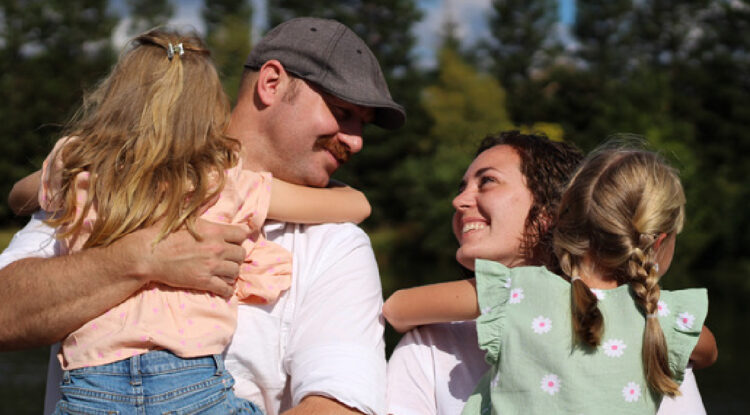A few weeks after becoming certified as foster parents through Wayfinder, Rebeca and Lee received a call about sisters Tatiana and Tessa,* ages 8 and 5. A judge had decided that reunification with their birth parents was no longer an option. The girls needed a permanent home, but they were living with a foster family that did not intend to adopt.
Lee and Rebeca brought bubbles, a frisbee and a ball to meet the girls in a park. The couple understood what the girls did not—Tatiana and Tessa were going to leave their foster family. Again, they were going to be separated from a familiar home. “We sat in a circle,” says Lee. “And as we passed the ball, we asked questions like ‘What’s your favorite color?’ to learn a little about each other.”
“As the adults, we knew what was happening when we first met the children,” says Rebeca. “We knew they were coming to live in our home. The children were meeting strangers, and they had no idea why.”
This is one of the significant insights that Rebeca and Lee had gained from watching and listening to the perspectives of former foster youth while becoming certified as foster parents. Through Wayfinder, the couple received extensive training and support, particularly because they had not been parents before. During the certification process, “Our first Wayfinder social worker, Monica, was always getting us more training, reading material and support groups,” Lee says.
A few weeks after that initial meeting, Tatiana and Tessa moved into Rebeca and Lee’s home. The couple quickly realized that Tatiana was extremely shy. She would not talk to anyone outside the family. “I gently pushed her out of her comfort zone,” Rebeca says. With Rebeca beside her, Tatiana practiced ordering her meal at a restaurant or asking where the bathroom was. “She needed to become more confident in herself and learn that her voice is important,” says Rebeca. One day in a restaurant, Tatiana began singing and acting funny. She had become confident enough to let her real personality emerge. Even the county social worker who had known the girls from the beginning was amazed—she had never seen Tatiana act goofy.
In Tessa’s case, she felt that no one listened to her and everything was her fault. Tessa told Lee and Rebeca, “Adults never believe me.” Hearing this broke Lee and Rebeca’s hearts. Whenever the girls argued or broke something, Rebeca and Lee would talk to them individually to hear their stories. Quickly, Tessa realized that the adults were listening to her point of view. She became more honest and open.
Through the ups and downs, Rebeca and Lee turned to their Wayfinder social workers, Kassandra and Bre. “I could talk to them about anything,” Rebeca says. “Even if I needed to vent, Kassandra was there like a friend and to say, ‘This is parenthood.’”
Gradually, Lee and Rebeca realized they were doing something right. “We are empowering them in a safe environment and pushing them as much as they are comfortable,” Lee says.
Lee and Rebeca did not expect the girls to call them “mom” and “dad” until they were ready. “They would call me ‘mom’ more in public than at home,” says Rebeca. “I want all foster or adoptive parents to understand. When we go outside the house with the children, they want the outside world to believe they blend into this family. Using ‘mom’ or ‘dad’ outside is because they don’t want anyone to know they are in foster care.”
Rebeca told them, “It’s your choice to call me ‘mom,’ but how about if ‘mom’ is your biological mom. She will always be your mom. And you have ‘foster mom.’ I am from Spain, so you can call me ‘mamá.’”
Listening to former foster youth, Rebeca and Lee learned another important lesson that they employed with the girls. “Children in foster care have lived with their biological parents, maybe grandma or with a foster family,” Lee says. “Different houses have different rules. To make them follow all your rules from the day they walk in is unrealistic. We tell them, ‘This is how we do things, but its’s not the only way. If you have any suggestions, tell us.’”
The adoption was finalized 13 months after Lee and Rebeca met Tatiana and Tessa. “Adoption day is a happy day and a sad day, a hard day, and an exciting day,” Lee explains. Children are relieved because they do not have to change homes again, but adoption also means they are not being reunited with their birth family.
“When you tell people you are adopting the children, they say ‘I’m so happy for you,’” says Rebeca. “But the children think ‘Why are they happy we don’t get to go back to our biological parents?’” Rebeca and Lee explained to the girls, “Your friends are happy you have a forever family since, because of the circumstances, you are not going back to your biological parents.’”
Rebeca and Lee are very grateful for the support they received from Wayfinder. “The training and philosophy of Wayfinder is apparent in how the social workers work,” Rebeca says. “They are amazing and knowledgeable people. I get emotional about Monica, Bre and Kassandra,” Rebeca says as she tears up. “It was hard to let them go. They become part of the family. They care so much for the well-being of everyone in our family.”
“We could not have asked for a better experience with Wayfinder,” says Lee.
Learn more … see Rebeca’s Top 5 Lessons for Foster or Adoptive Parents.
September 27, 2023


